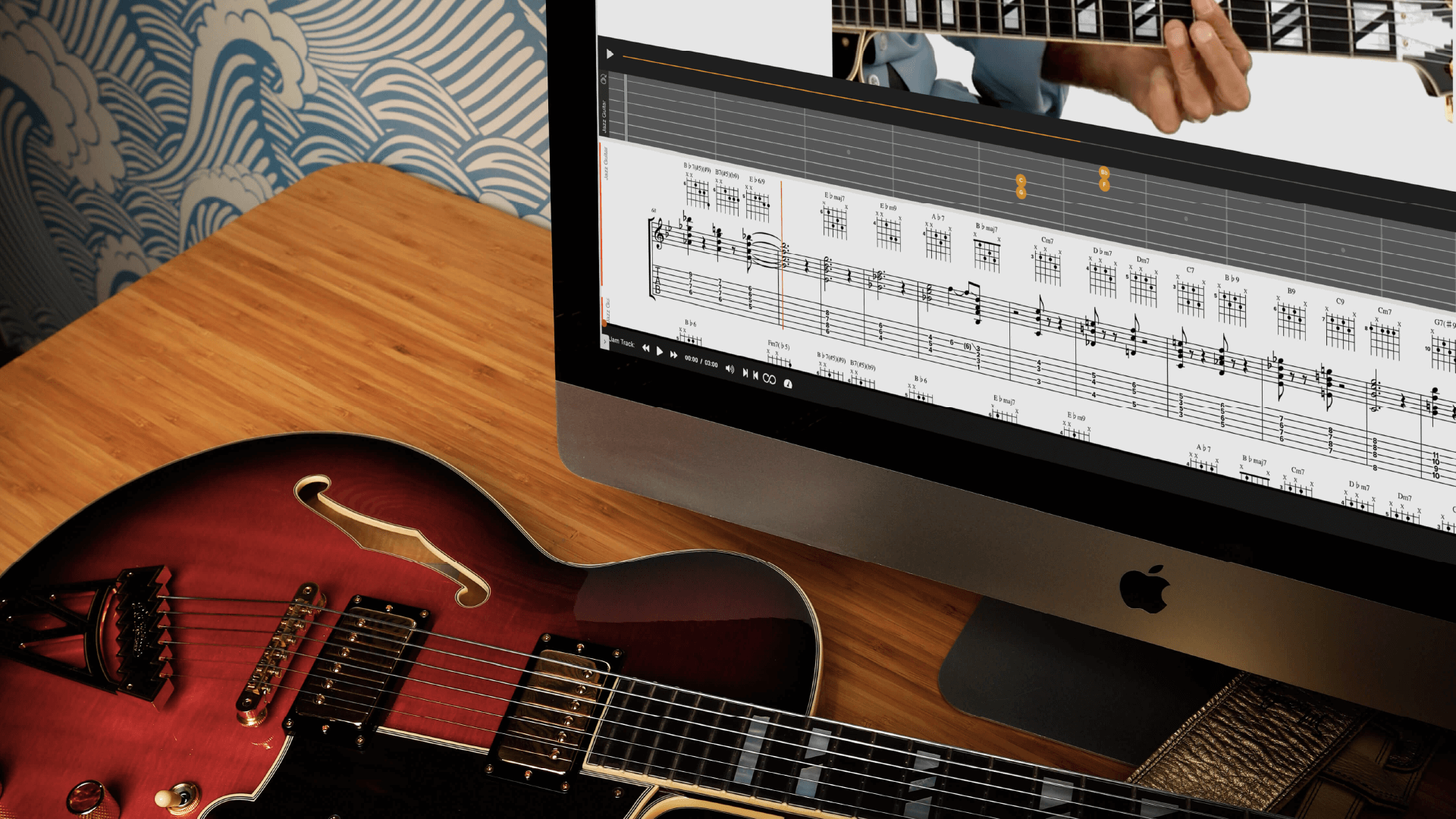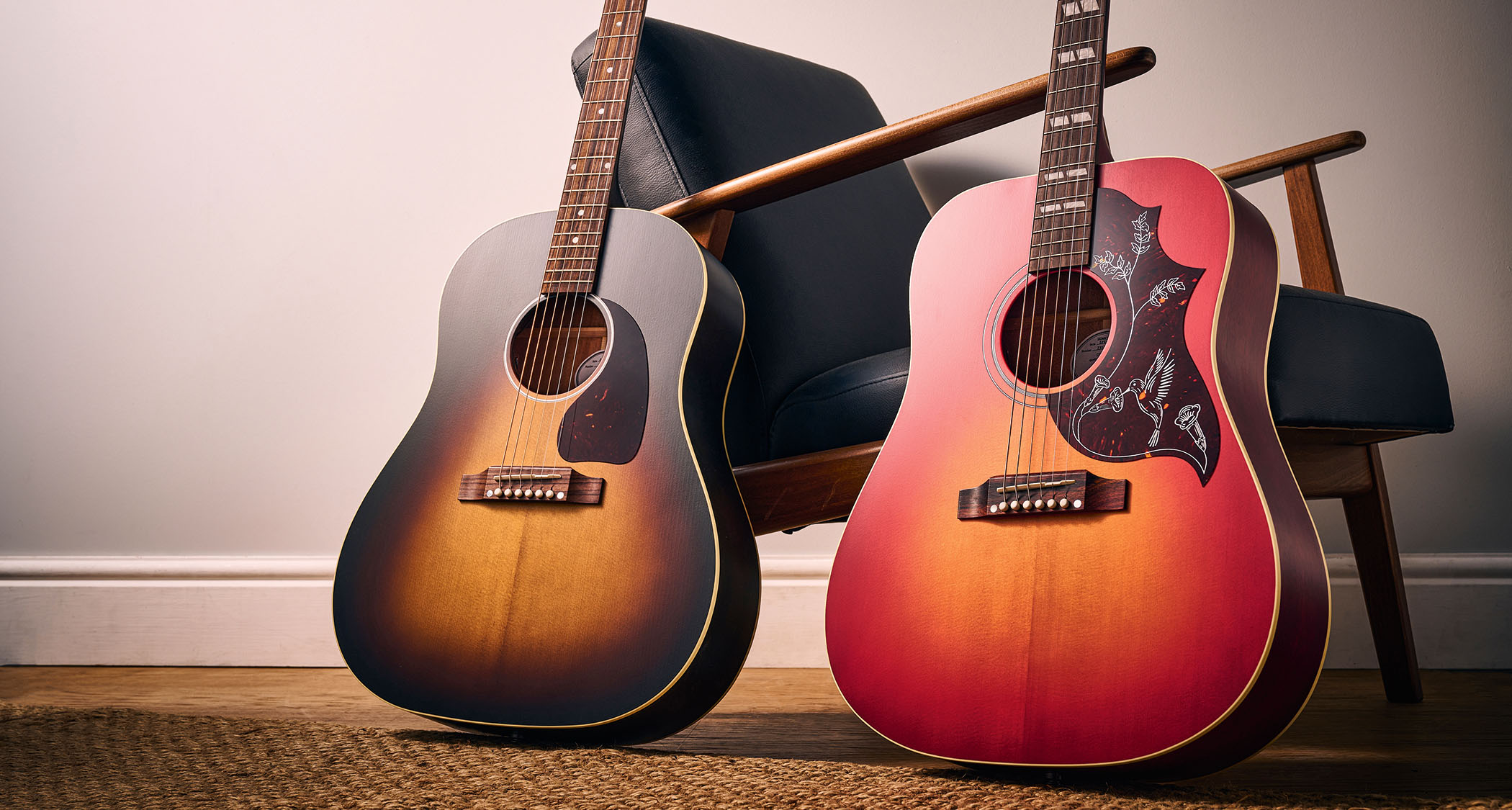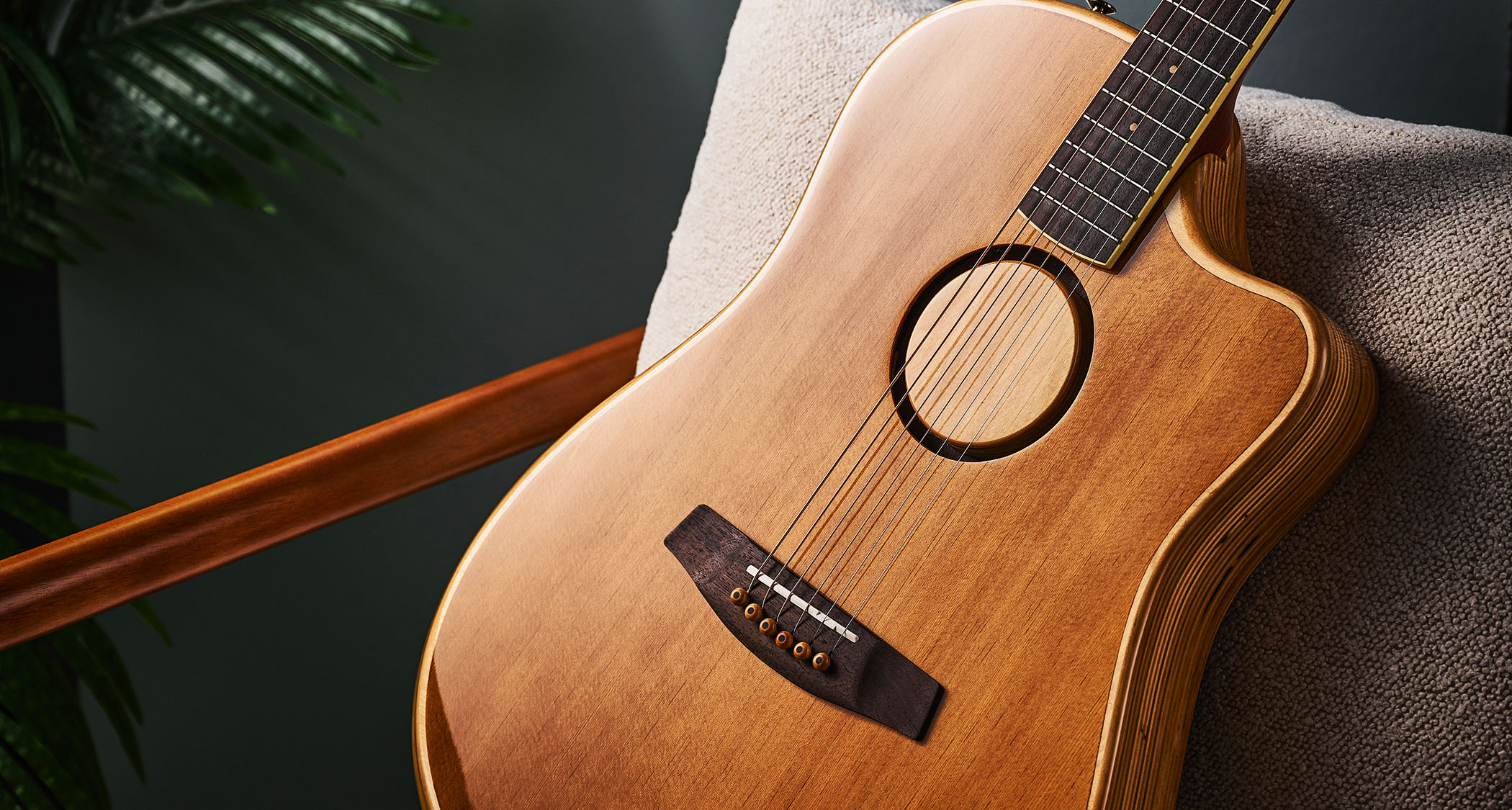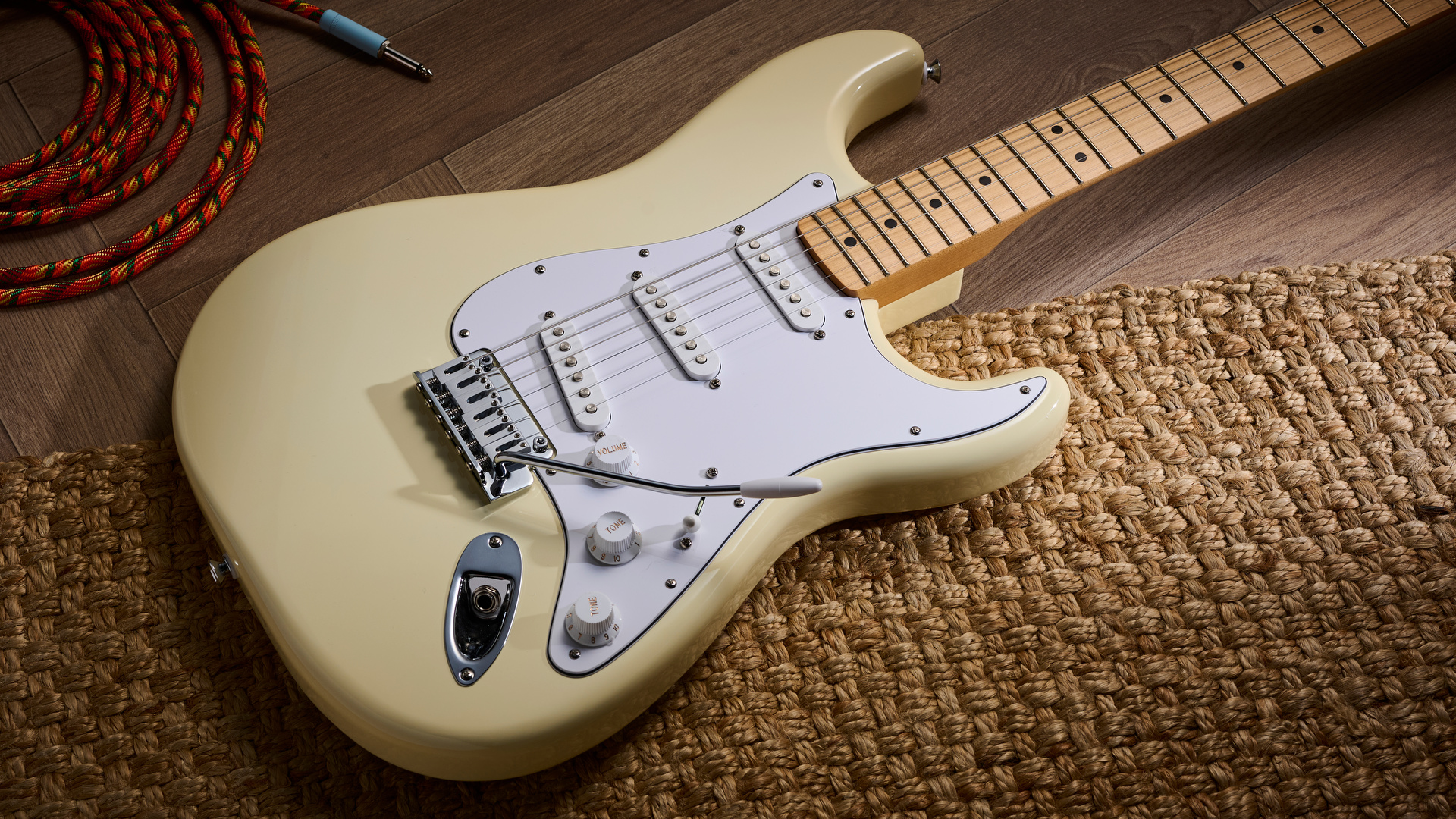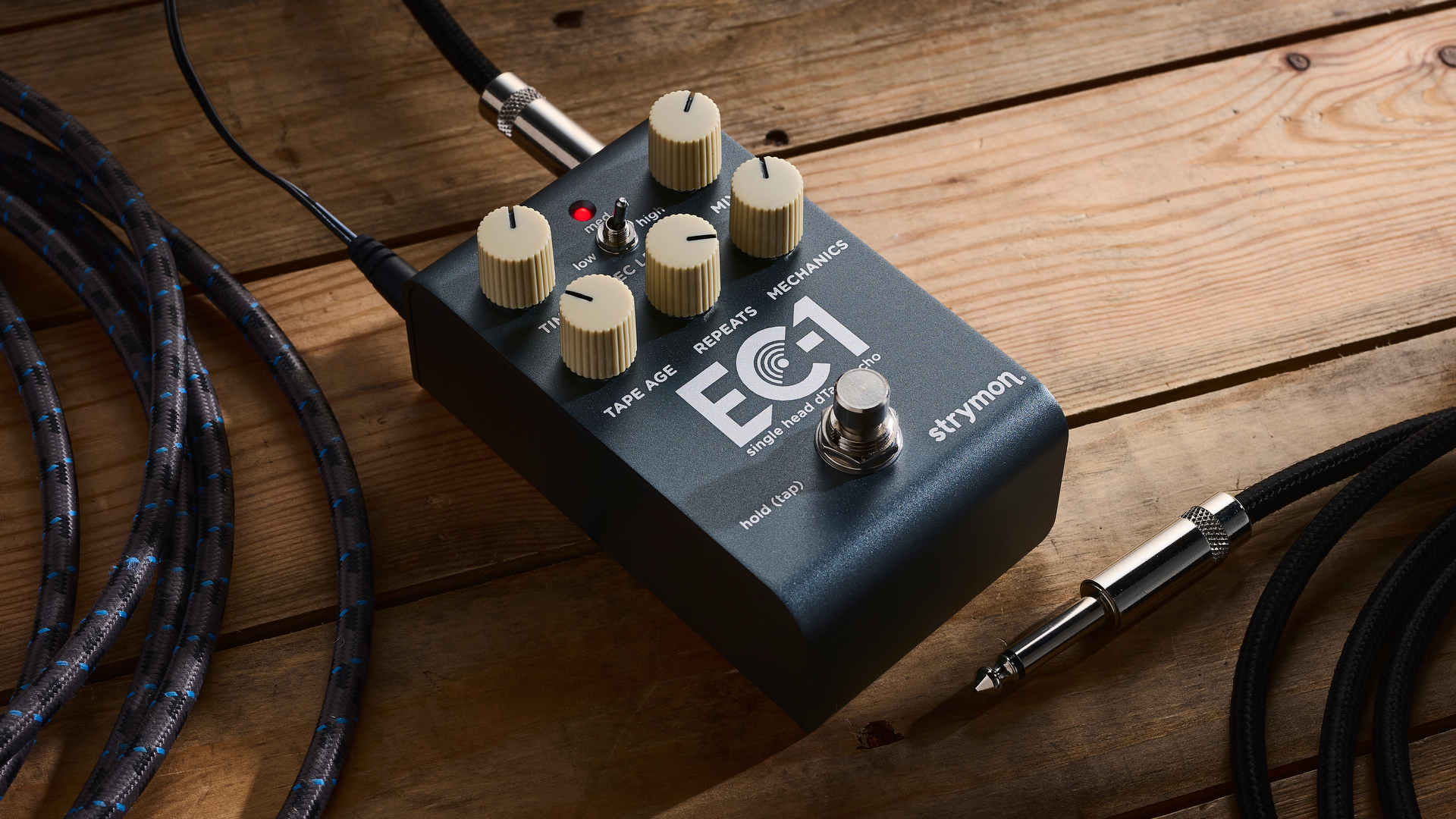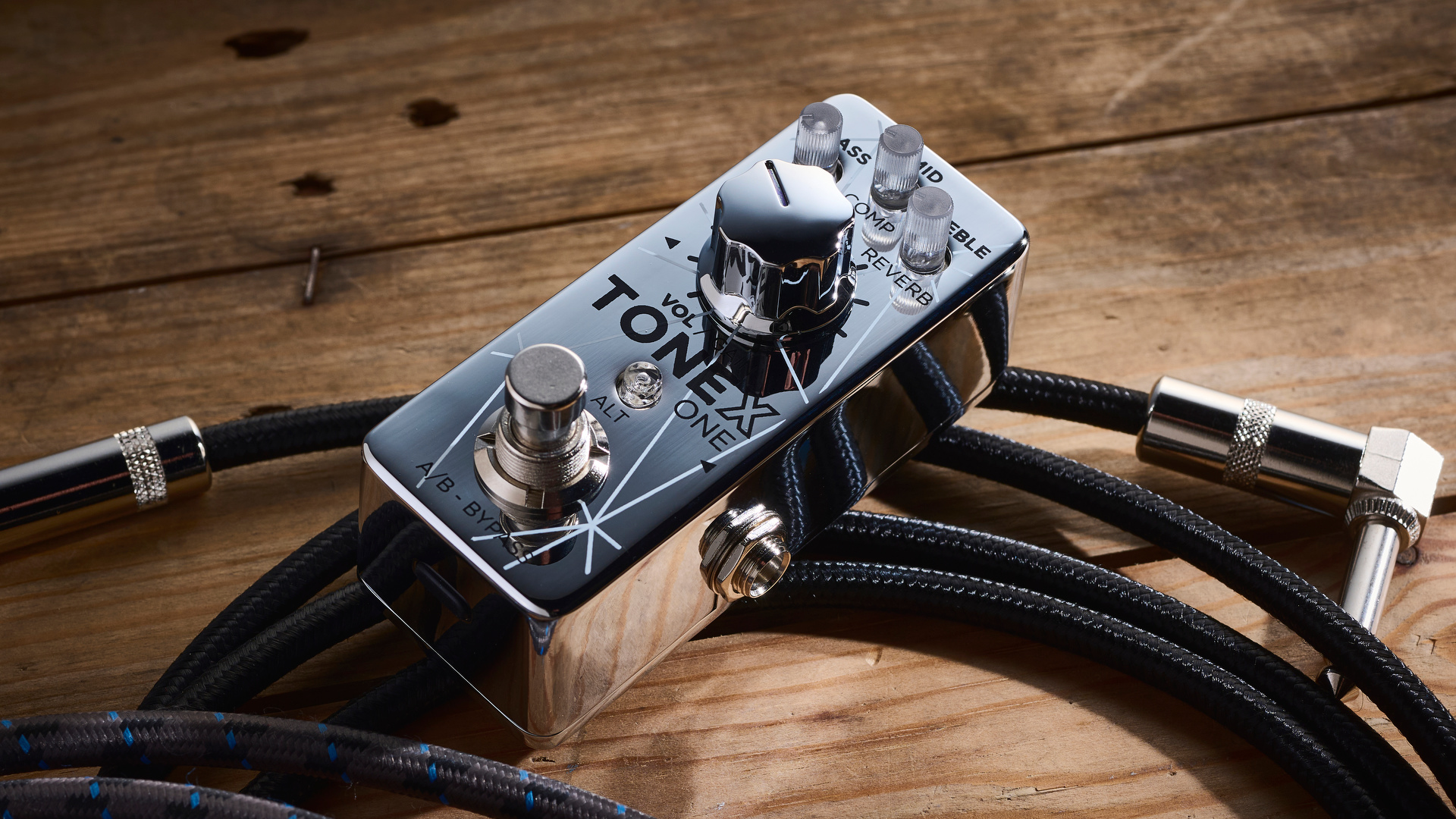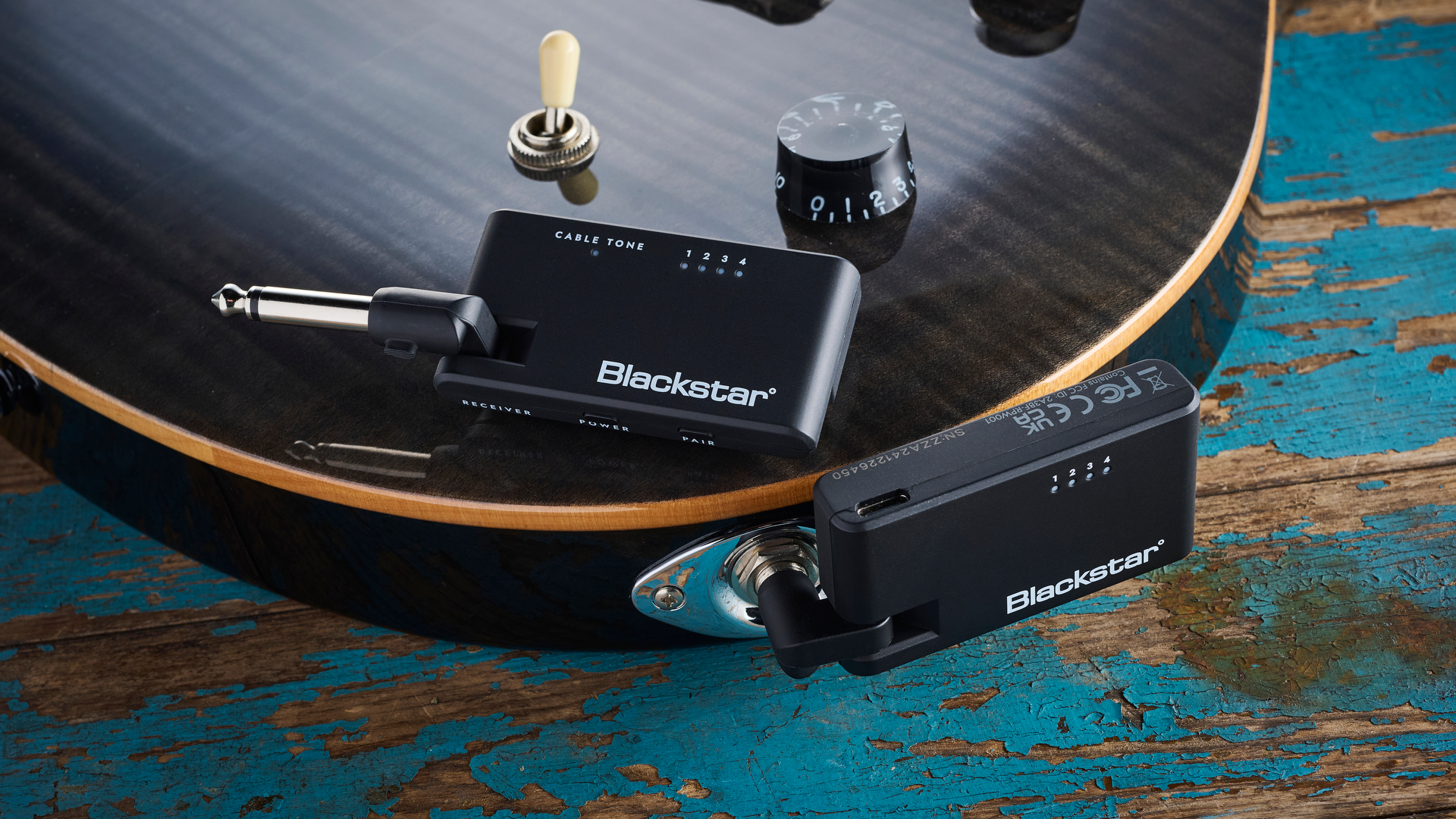Guitar World Verdict
TrueFire offers a smorgasbord of online guitar tuition that’s suitable for beginners and lifelong learners alike. From blues to flamenco, there's lots for everyone. We have questions about the lacklustre song library, but there's plenty elsewhere on the site to keep most players busy.
Pros
- +
Massive 85,000-strong video library
- +
Celebrity instructors
- +
Covers niche and specific aspects of the instrument
- +
Well-suited for advanced players
- +
In-depth courses for virtually every guitar genre
Cons
- -
Platform is a little messy due to size and diversity of content
- -
Beginners may find site overwhelming
- -
Song library is limited
You can trust Guitar World
All Access Annual Plan: $249/£178 per year, or a discounted price during promotions; All Access Monthly Plan: $29/£21 per month;
One-on-one lessons: $45/£36 for half an hour or $70/£56 per hour;
Free trial: 14-day free trial available
Visit: TrueFire
For the purposes of this review, TrueFire granted us full access to their online lessons platform.
As the oldest, or perhaps longest-serving online guitar lesson hub, TrueFire has amassed quite the content library – nearly 85,000 video lessons as we write this, in fact. Factor in that these video lessons come from over 400 acclaimed and Grammy-winning guitarists, such as Yvette Young, Tommy Emmanuel, Steve Vai, and Dweezil Zappa, and you have one of, if not the most comprehensive and informative guitar tutorial sites around. It is not quite perfect, and some of its strengths paradoxically lead its weaknesses, but we’ll get into all that very soon.
Founded in 1991, TrueFire has rightfully become something of a cornerstone of the online guitar tutorial world, often serving as the standard for what these types of platforms can and should deliver. With the weight and knowledge brought by a diverse range of instructors – some famous, some less so, but all nonetheless well-equipped to deliver the task at hand – TrueFire has been able to build up a treasure trove of information that covers even more specialties and advanced aspects of the instrument.
We originally reviewed TrueFire in February 2022, but have since revisited the platform to re-assess our opinions and check out new features. This review has been updated based on our findings. We've included our own screen shots from our testing for this review, too.
TrueFire lessons: Save 30% with code GWTF30
TrueFire includes 50,000 video lessons taught by industry-leading teachers, Grammy Award-winning artists and world-class touring musicians. And in case that wasn't good enough, you can save 30% off an All-Access subscription and all courses with the exclusive code GWTF30.
| Free trial | Monthly plan | Annual plan | One-on-one lessons | Free trial |
| Yes | $29/£21 | $249/£178 | $45/£36 | 14-days |
Firing up TrueFire

TrueFire is truly massive. Almost 85,000 instructional videos await, taught by hundreds of instructors, including big names such as Joe Bonamassa, Greg Koch, Tommy Emmanuel, Robben Ford, Matt Schofield, Larry Carlton, Steve Vai and Ariel Posen. It has associated apps and blogs, a huge Facebook presence, jam tracks, one-to-one lessons – the feature set is just huge.
Essentially, though, if we sweep the extras aside for a moment, it's all about delivering high-quality courses to guitar players of all levels for a subscription of $29 per month or $249 per year. It’s possible to forgo a subscription and buy individual courses but, unless your needs are very specific, this isn't cost-effective. A 14-day free trial is available, and we recommend you take advantage of this before parting with your hard-earned cash.
Log on to a competitor site – Fender Play, for example – and you'll be greeted by a prominent banner welcoming you to learn how to play the guitar with them. The implication is that you're a beginner about to embark on (no pun intended) a set course.
TrueFire feels different. There's little in the way of 'start here' signposting, and it doesn't make any assumptions about who you are, why you're here or what you need to learn. Instead, you're presented with a plethora of content – mostly courses – to watch.
Frankly, on the first visit this is a little disconcerting, and certainly rather overwhelming. Yet on subsequent visits, as you become better acquainted with the site, the approach begins to make sense. TrueFire isn’t exclusively for beginners, so it doesn't pander to them. Yes, there's more than enough beginner content here, but there's also a heck of a lot for intermediate and expert players, too.
The biggest learning library out there
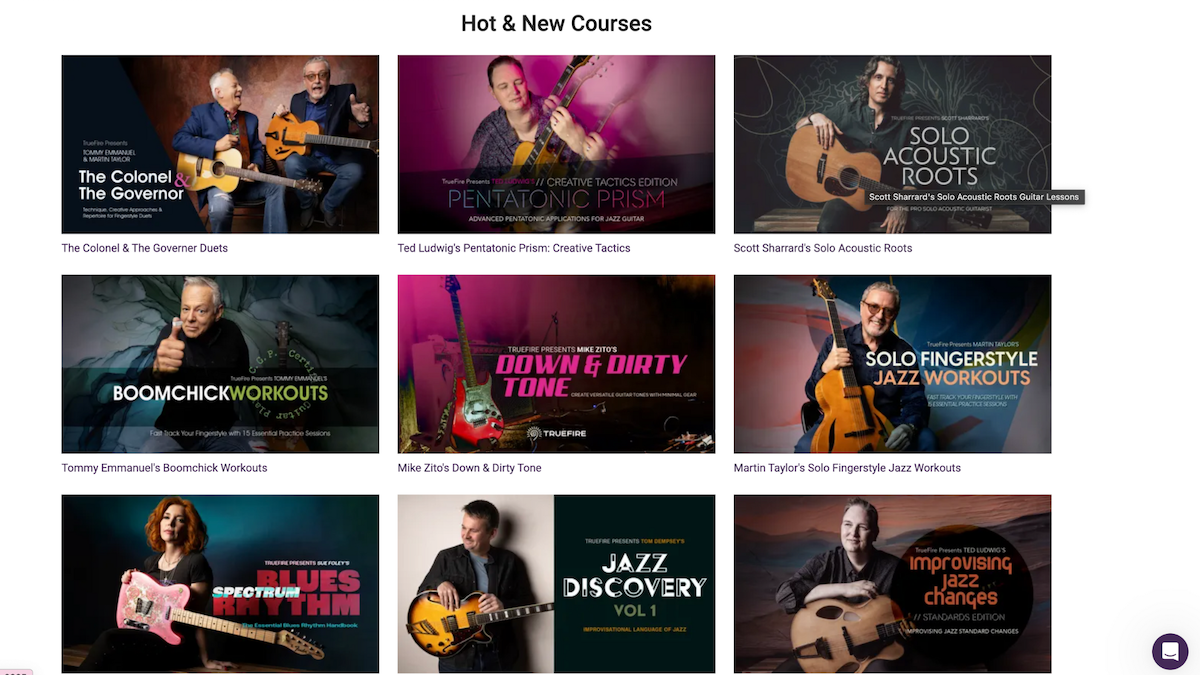
TrueFire’s vast library is its most distinguishing feature. With nearly 85,000 video lessons – some 30,000 of which arrived on the site within the last two years – and spanning every conceivable style and technique, it’s a haven for guitarists who love to explore. From classic rock and blues to gypsy jazz, funk, flamenco, and beyond, TrueFire caters to players across genres, interests, and skill levels. It’s also one of the few platforms that dives deeply into more specialist areas like slide guitar to advanced improvisational techniques and alternate tunings to drop 2 voicings – you can find some top-quality resources to help you with pretty much anything you want to learn about.
This diversity is further enhanced by its lineup of instructors. With over 300 teachers coming from a range of different backgrounds and playing styles, the platform offers a unique blend of perspectives. The presence of Grammy-winning artists alongside seasoned session players ensures that every lesson is infused with both technical expertise and a deep understanding of musicality. Who better to get a course on fingerpicking than Tommy Emmanuel!?
However, while this is almost certainly TrueFire’s best asset, it’s also – perhaps unavoidably – set it up for one of its biggest setbacks. With so much to choose from, even experienced players may find themselves unsure where to begin. TrueFire does provide learning paths and curated playlists, but the structure isn’t as streamlined as other platforms like Guitar Tricks or FenderPlay. This flexibility is great for self-directed learners, but may leave others who need their hand held a little more feeling adrift.
That being said, what we do like is the way TrueFire has executed their paths. Each path consists of five levels – beginner, late beginner, intermediate, late intermediate, and advanced – which we feel more credibly targets the levels guitarists might find themselves at than any of TrueFire’s counterparts. From there you can jump in at the point that suits you best.
A level comprises between four and ten courses, each of which typically features 30 or more video lessons. Imagine you’re a beginner aspiring to reach advanced level – that's a lot of content. But we haven't even scratched the surface!
As you’d expect, beginner lessons start off with very basic skills, such as how to hold your guitar. However, reassuringly, the advanced stuff really is pretty full-on. For example, the advanced jazz level has Larry Carlton teaching his approach to soloing.
As you work through the levels – which will obviously take some time – TrueFire will suggest optional supplementary courses for you to consider. This provides the opportunity to study some of the techniques touched on in the pathways in greater depth. For example, a supplementary course recommended on the rock pathway is Robbie Calvo's 52-lesson Double Stop Chops, which is doubtless essential if you want to master those Hendrix-style double stops.
Of course, you don't have to enroll in a Learning Path if you don't want to. Instead, you can explore the thousands of freestyle courses on offer. These are grouped under section headings such as blues, jazz, funk, bluegrass, fingerstyle etc, with each offering hundreds of lessons covering every aspect of the style.
Due to the sheer scale and variety on offer here however, we found that a simple search was the most effective way to find what you’re looking for.
Song library
Many of TrueFire's other competitors have established significant song libraries that’ll enable you to learn your favorite Stones track, or maybe something more contemporary by pop acts like Olivia Rodrigo or Billie Eilish. TrueFire has a bit of a perplexing song library. While there are around 400 songs on here by our measure, the choices are a little strange.
While we’re happy to see there is a good representation of heavier bands in here, such as Mastodon, Entombed and even Meshuggah, there are multiple entries for artists like Eve 6, Staind and the Goo Goo Dolls. Each of those has more songs in the library than the likes of Led Zeppelin (0 songs!), Fleetwood Mac, Metallica, Bob Dylan – or anybody you can think of that isn’t the Beatles or Megadeth, who have an equal weighting of 13 songs each.
We don’t want to get too hung up on this point, but it just seems a little… oddly specific for the size of the song database, which is smaller than the likes of Guitar Tricks or Fender Play, and we’re just left wondering what the wider appeal here is?
That being said, we found the actual song lessons to be better presented and constructed than some competitors, so that has to count for something. We just think there should be a little more focus and attention going into the curation of the song library to be of ongoing value, particularly for song-based learners.
The learning experience
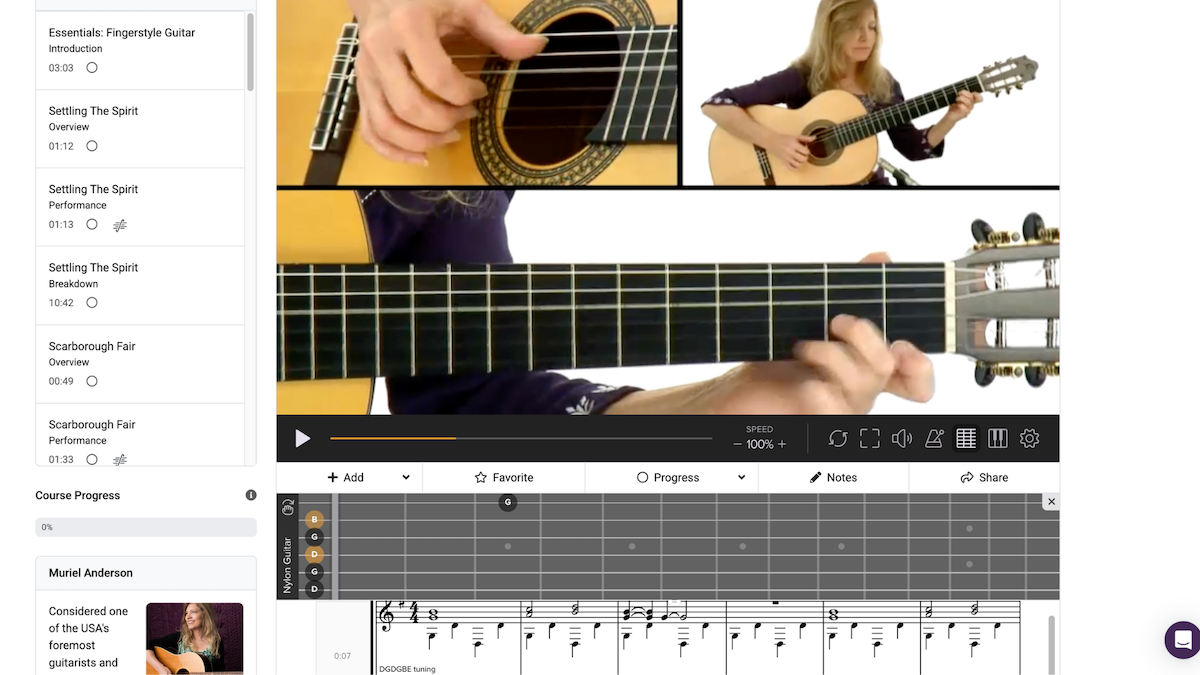
Once you start getting down to business, TrueFire’s learning experience is not a million miles away from its competitors. Lessons feature multiple camera angles that let you clearly see both the left hand and the right hand, along with a zoomed-out view. But there is one clear advantage to TrueFire, and that is the incorporation of Soundslice to create synced notation and animated fretboard diagrams to its lessons. We can’t stress how useful this feature is in practice.
Soundslice enables you to see both standard notation and tablature synced to the teacher's playing. You can slow the video down, or loop it, and it’ll remain synced. Or you can jump to a particular section just by clicking on the relevant notes in the notation. Frankly, seeing tabs in sync is only marginally useful, but if you know even a smattering of standard notation, you'll find Soundslice a godsend during the first few playthroughs. It reveals so much information about the piece of music you're trying to learn.
Added extras
The vast majority of content on TrueFire will be included in your subscription, including regular lessons, courses, songs and Learning Paths. However, some content does carry an additional charge, including various flavors of jam packs and premium channels, which are self-produced instructional videos from a variety of teachers – including some very well-known names.
Like its counterparts, TrueFire also offers private lessons at an extra cost. These are not live lessons in real time; instead, you choose an instructor and upload a video for them to assess. The selling point of this is the flexibility for scheduling two parties who likely operate in different time zones.
For those that need more immediate feedback and a more hands-on instructor, so to speak, you can opt for either a one-off or a series of lessons for $45 for half an hour or $70 a full hour, with discounts applied for booking packages.
That being said, TrueFire also does offer free in-depth packages with live instructors. At the time of writing they are running a free 10-week guitar boot camp course, which blends on-demand video lessons, live Zoom sessions, moderated homework feedback, and vibrant community interaction, all led by their approved educators. This course is set to finish in March but we expect to see this happening again in some form.
Conclusion
Most online guitar tuition platforms focus on teaching beginners how to play the guitar. TrueFire covers that ground too, but we feel it better serves the intermediate and advanced players. It also arguably is best suited for more dedicated or disciplined players who don’t mind spending their time practicing scales and patterns as well as learning theory, rather than guitarists who are looking to learn from solely playing songs.
But if that sounds like you, TrueFire could well be your best online resource for learning the guitar right now.
When Simon's childhood classical guitar teacher boasted he 'enjoyed a challenge', the poor man had no idea how much he'd underestimated the scale of the task ahead. Despite Simon's lack of talent, the experience did spark a lifelong passion for music. His classical guitar was discarded for an electric, then a room full of electrics before Simon discovered the joys of keys. Against all odds, Simon somehow managed to blag a career as a fashion journalist, but he's now more suitably employed writing for Guitar World and MusicRadar. When not writing or playing, he can be found terrifying himself on his mountain bike.
You must confirm your public display name before commenting
Please logout and then login again, you will then be prompted to enter your display name.
“There are so many sounds to be discovered when you get away from using a pick”: Jared James Nichols shows you how to add “snap, crackle and pop” to your playing with banjo rolls and string snaps
Don't let chord inversions bamboozle you. It's simply the case of shuffling the notes around
